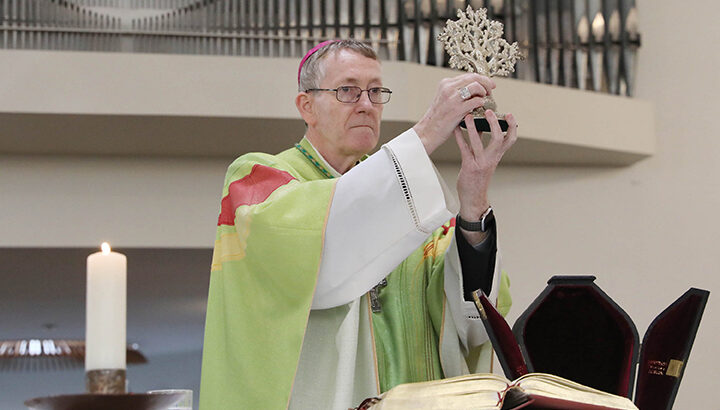A view from the Seanad
The statement from the Catholic bishops on the referendums on ‘Family’ and ‘Care’ on March 8 is covered elsewhere in these pages, but I’d like to offer a couple of observations. Bishops, these days, are slow to say ‘Vote Yes or No’ to anything. They rightly judge that any direct exhortation can be seized on and portrayed as ‘episcopal diktat’ by political forces opposed to the Christian vision of society.
But the bishops have not gone missing. Their statement highlights the demotion of motherhood and life in the home entailed in the ‘Care’ referendum. It warns about the weakening of the incentive to marry that would flow from the ‘Family’ referendum with its importation of the unknown quantity that is ‘durable relationships’ as the equal basis for family life and Constitutional rights. It is clear where the bishops stand and the statement is worth reading in full.
In producing a top-quality, humdinger of a statement on the referendums, the bishops have done their bit. But can parishes help by getting the word out? There was no mention of the statement, just hot off the presses, at the Mass I attended on Sunday. I’d understand if it was a case of an email not being opened yet.
But hopefully there isn’t apathy, reluctance or fear about mentioning a voting matter. “This is a good statement that will interest people.” I’d encourage clergy, religious and lay people of faith – anyone with a congregation, an audience or an email or social media network – to draw people’s attention to the Bishops’ statement and make it available for people’s consideration before they vote. That is civic participation at its best.
One last point on the Referendum. The proposed deletion of mothers, i.e. women who have children, was not necessary to make the Constitution more directly inclusive of men as fathers. The Government could easily have put in a reference to fathers and their duties in the home. That would have been very timely given all we know about the importance of fathers in children’s upbringing and the sad consequences that often flow from their absence.
But our political establishment – elements within the Government, civil service, health establishment and NGOs – are on a different track. Mothers are seen as necessary casualties in the ongoing war on biological reality.
Nothing that distinguishes between biological women and biological men in the ordering of our common life is to be tolerated. So the elimination of ‘mother’ from the Constitution is, among other things, about smuggling in this strange and destructive political agenda.
The age of the Independent?
How do we speak up about all the bad things going on in the world while recognising the good in people and showing the reasons for hope at the same time? That is a perennial challenge for Christians in and out of politics. I’ve been thinking about it lately because there are a lot of destructive policies coming at us from our Government. Think of the anti-life sentiment, the proposed restrictions on free expression, the attacks on school curricula, the war on women-only spaces, and the poorly thought-out policies on migration (it needs to be generous but structured and there can be no censoring of the hard questions).
Add to that the mismanagement of uncontrollable spending in the health sector, growing homelessness despite exchequer surpluses, and it looks like we have a Government strong on ideology but weak on people’s day-to-day struggles.
I don’t say that every politician in the Government agrees with the destructive cultural nonsense being shoved our way, but it is clear that the cat has got the tongue of many political leaders whom we might think should know better. “The best lack all conviction, and the worst are full of passionate intensity,” Yeats wrote.
And, yes, it does seem that a combination of unprincipled political ambition, misuse of the party whip system, excessive media consciousness and the conditioning of political minds by international consensus are all contributing to bad policies coming from the top.
While I get it that we need political parties and some element of party discipline to maintain overall policy coherence, I am glad to be an Independent right now. This past year it is mostly the Independents, as well as Peadar Tóibín and Aontú, who have resisted the supposedly ‘progressive’ push on gender policies, the attempts at restricting free speech in the Hate Speech legislation, so-called ‘safe access’ zones legislation that seeks to crush dissent on abortion – and the rest.
The main political parties have been captured by their ideologues within and the NGOs backing them up. And that suggests to me that we need more Independents, not less, for the foreseeable future.
I would say that, wouldn’t I?
A party man who kept his principles
In contrast to all I have said here about the sometimes stifling impact of party thinking, we saw in the late John Bruton a politician who was deeply committed to his party and its policies (which I did not always agree with), and who was highly pragmatic. Yet, faced with the big questions about meaning of life and the cause of protecting life, he came up trumps.
In the mid-1990s an RTÉ journalist asked the then Taoiseach whether his government would introduce legislation for the X-case. “No” was the answer. “Why not?” “Because that would have the effect of bringing abortion into Ireland.”
No equivocation. No destructive ambiguity or proposal to put the matter to a committee. Just a straight-forward commitment to protecting human rights and cherishing human life. The type of commitment we still need.
I was honoured as were, I suspect, many others to get John’s support and encouragement from time to time. A few weeks after Christmas I received a short handwritten note in response to a card I had sent. Words of encouragement. Then “My health is volatile. I’m good today”.
May John now enjoy eternal good health, where every tear is wiped away.
Rónán Mullen is an Independent Senator and barrister.


 Senator Ronan Mullen
Senator Ronan Mullen Irish Bishop Denis Nulty of Kildare and Leighlin raises the St. Brigid relic after removing it from its box at the beginning of Mass at St. Brigid’s Church in Kildare January 28, 2024. Photos: OSV News/John Mc Elroy
Irish Bishop Denis Nulty of Kildare and Leighlin raises the St. Brigid relic after removing it from its box at the beginning of Mass at St. Brigid’s Church in Kildare January 28, 2024. Photos: OSV News/John Mc Elroy 